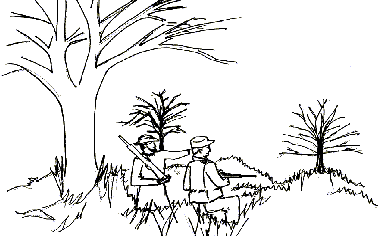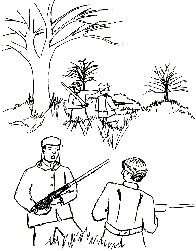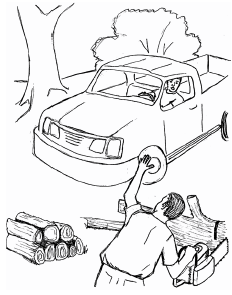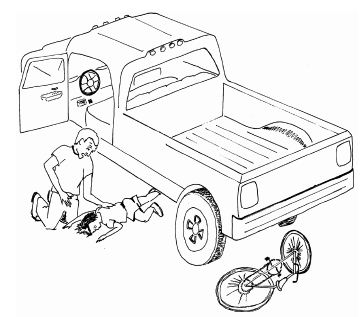Hearing Loss - "Sound Advice throughout the Years" Problem Booklet
Sound
Advice throughout the Years

Initially developed in 1999 at a three-day workshop at the Southeast Center for Agricultural Health and Injury Prevention. Revised by Pamela Kidd, Deborah Reed, Henry Cole, Daniel Rosnik and Tim Struttmann under CDC/NIODSH Grant #5 RO1 CCR414307, Deborah Reed, PI. Revised by Henry Cole PI and Joan Mazur Co-PI as January 2001 as part of a multimedia instructional materials project supported by CDC/NIOSH Cooperative Agreement # U06/CCU417554-02.
Sound Advice throughout the Years
This is a story about two boys who became and remained life-long friends as they grew up, ran their farms and raised their own families.
Instructions
Get together with two or three of your friends. Then read the story and answer the questions that appear in the story.
As you complete each question, mark your answers on the answer sheet by circling T for “True” and F for “False.” After you have selected your answer to each question, discuss your choices with your friends. Then continue reading the story and answering the remaining questions in order in which they appear. Please don’t jump ahead, but it is OK to look back at your completed questions and answers any time you wish.
When you finish the story, ask the instructor for a copy of the answer key. Compare your answers to those in the answer key. Discuss the story and answers with your friends and the instructor. Then complete the questionnaire attached to the answer sheet. Give this problem booklet and your completed answer sheet to the instructor. Your answers will be used to improve the exercise. Thanks!
Introduction
The story begins when the boys are 16 and ends when they are grandparents at age 55. As you complete this exercise, you will interact with each other and with the characters in the story. You will be asked to make decisions that can prevent serious work-related hearing loss for the characters in the story. Many farmers develop this serious problem. This story will help you to understand the serious nature of noise-induced hearing loss and to take the simple steps to protect your hearing to avoid the
JR and PeteJR and Pete are both 16 and live on neighboring farms. The boys have been best buddies since age four. Both families operate grain and beef cattle farms. Both boys do many farm chores. They work around and operate noisy farm equipment like tractors, feed grinders, forage choppers, silo blowers, grain dryer fans and chainsaws.
Quail HuntingIt’s November 13, the first day of quail hunting season. JR and Pete are going hunting with their dads. The boys and their dads spend the evening before the hunt getting their gear together. They set their alarms for 5:00 AM so they will have plenty of time to eat breakfast and be out in the fields as soon as it’s light.
They plan to hunt for most of the day. The hunting laws in their state permit hunting from one-half hour before sunup until a half-hour after sundown.

The next morning at 7:00 AM the four hunters are in the brush hoping to raise some of quail. JR’s dad says, “Son, are your earplugs in?” JR replies, “Oh, Dad!” but he gets them out of his pocket and puts them in his ears.
Question A
As the boys continue to talk, Pete makes the following comments about why JR doesn’t need to wear earplugs. Which of Pete’s statements are true? (For each item, circle T or F on the answer sheet.)
|
T |
F |
1 |
“You don’t need ear plugs. The guns aren’t that loud.” |
|
T |
F |
2 |
“You don’t need earplugs because we won’t be shooting that often.” |
|
T |
F |
3 |
“Earplugs or earmuffs don’t help anyway.” |
|
T |
F |
4 |
“If you use earplugs you can’t hear the quail.” |
|
T |
F |
5 |
“If you use earplugs, you won’t be able to hear me talk to you.” |
|
T |
F |
6 |
“It would be just as good to stuff your ears with cotton.” |
|
T |
F |
7 |
“If you don’t wear earplugs or earmuffs and we shoot a lot, your ears will just feel stuffy at the end of the day, but in a few hours your ears will be fine.” |
Three years have passed. JR and Pete are now 19 years old. It’s fall and they are harvesting forage. Pete is driving a 90-hp diesel open-cab tractor to chop alfalfa and fill the self-unloading wagons. JR is using an 80-hp tractor and silo blower to move the chopped alfalfa from the wagons into the silo. After four hours they stop for a drink of water and to switch off jobs. JR takes out his earplugs.
JR says, “Pete, where are your plugs?”
Pete says, “Plugs? These diesels don’t have spark plugs!”
JR laughs and says, “You know what I mean! Earplugs!”
Pete replies, “I don’t really need them. Noise doesn’t get to me. Besides, my dad says that he never wears them, and he can hear just fine.”
Question
B
What should JR tell Pete if he wants to give his friend good advice about his hearing? (For each item, circle T or F on the answer sheet.)
|
T |
F |
8 |
“If your ears are only ringing, it won’t cause you any harm.” |
|
T |
F |
9 |
“As long as your ears aren’t hurting, you’re safe.” |
|
T |
F |
10 |
“If you don’t wear earplugs during noisy jobs like these, when you quit working you probably won’t be able to hear quiet sounds for awhile.” |
|
T |
F |
11 |
“If your ears feel like they are plugged up, you’ve been around loud noise too long your hearing has already been damaged.” |
|
T |
F |
12 |
“If you don’t want your ears to bother you when you’re working around noisy machinery, put on your radio head set and turn the volume up until the music drowns out the noise.” |

Four years have passed. Pete and JR are still best friends. Today Pete is cutting firewood for winter. When he sees JR drive up in his pickup, Pete shuts down his chainsaw. JR rolls down the window and says, “Man, when are you ever gonna learn to use earplugs?”
Pete looks up and says, “Huh?” JR laughs, hops out, and then helps Pete load the wood into his pickup. As they work, JR notices that Pete can’t hear very well. But, as usual, Pete gives several excuses for not wearing earplugs or earmuffs.
Question C
Which of Pete’s excuses do you think other people use for not wearing hearing protection? (For each item, circle T or F on the answer sheet.)
|
T |
F |
13 |
“They’re too uncomfortable.” |
|
T |
F |
14 |
“They cost too much.” |
|
T |
F |
15 |
“I forget to bring them along.” |
|
T |
F |
16 |
“They don’t help in the long run.” |
|
T |
F |
17 |
“I never wear them and I can hear just fine except when I’m around a lot of people all talking at once.” |
A Terrible Day
Many years have passed. JR and Pete are now 55 years old. On his way to town to get some calf feed JR stops to visit Pete. While they sit at the kitchen table and talk, Pete has trouble hearing JR because Sarah (Pete’s wife) is rattling pans as she washes dishes. Pete says, “I just saw Doc Martin for my annual physical. He told me I need a hearing aid! Can you imagine that?”
Ellen, Pete’s five-year-old granddaughter, bounces in and climbs in his lap. She gives him a big hug and then runs outside to play. She’s staying with Pete and Sarah this week while her parents are away.
After awhile Pete says, “Let’s use my new 4x4 truck to go get your feed!” Then he and JR go out and get into Pete’s truck.
As Pete backs up, his granddaughter runs behind the truck yelling, “Stop Papaw! You’re gonna hit my bike!”
JR hears Ellen yelling but Pete continues to back up. JR grabs Pete’s shoulder and yells, “Stop!”
Pete slams on the brakes, but it’s too late! He screams, as he feels the horrible thud of the truck running over his granddaughter as she scrambles to move her bike.
Pete and JR get out of the truck. Ellen isn’t moving. JR runs into the house to call 911. Pete crouches next to his granddaughter and sobs uncontrollably.

Question
D
Think about this story and how a hearing loss can affect a person and his or her family. Which of the following things could happen to you if you work around noisy equipment without hearing protection and end up with a hearing loss? (For each item, circle T or F on the answer sheet.)
T |
F |
18 |
You may have trouble communicating with your family and friends, especially when talking on the telephone. |
T |
F |
19 |
Because you can’t hear what other people are saying, you may feel frustrated and become isolated. |
T |
F |
20 |
You might hurt yourself or someone else because you can’t hear warning sounds and cries. |
T |
F |
21 |
You might not be able to hear other people’s shouts for help or other sounds of distress and wouldn’t know to help them. |
T |
F |
22 |
You could use a hearing aid to boost and restore your hearing. |
T |
F |
23 |
Buying and maintaining hearing aids may be a financial burden for you and your family. |
T |
F |
24 |
You may not be able to enjoy your favorite music or TV programs. |
T |
F |
25 |
People may think you’re “too good to talk to them” because they think you’re ignoring them when they speak to you. |
T |
F |
26 |
If you have a hearing loss at least it will be quiet. You won’t have to listen to a lot of distracting noise. |
End of the Story
Please make sure you mark your answers on the answer sheet and complete the questionnaire attached to the answer sheet.
Ask the instructor for a copy of the Answer Key. Compare your ideas and answers to the Answer Key. Discuss any ideas and differences of opinion. Give your completed answer sheet and questionnaire to the instructor. Thanks! Your answers will help improve the exercise.
Back to Contents
This curriculum guide was supported by Grant Number 1 R01/CCR414307 from NIOSH. Its contents are solely the responsibility of the authors and do not necessarily represent the official views of NIOSH. Special thanks to Dr. Ted Scharf.
Disclaimer and Reproduction Information: Information in NASD does not represent NIOSH policy. Information included in NASD appears by permission of the author and/or copyright holder. More